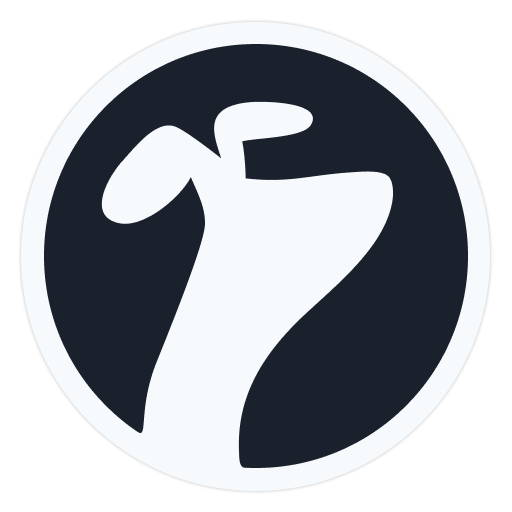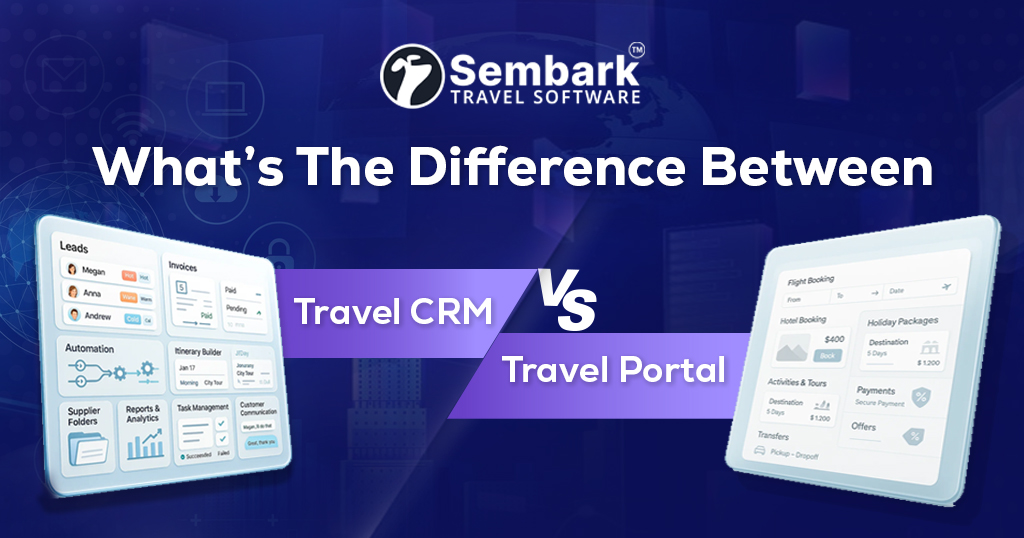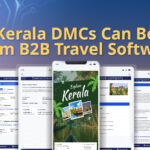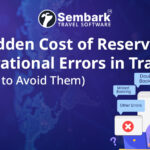Technology in the travel industry is no longer a supporting tool, but it’s the backbone of how travel businesses operate and how customers experience travel. Gone are the days, where you were carrying a bag full of files for each tour. Travel agencies, tour operators, DMCs and corporate travel departments, every player relies on software solutions for competitive advantage.
However, If you run a travel business and wish to digitalise your operations, you’ve probably come across two terms repeatedly: Travel CRM Software and Travel Portal. At first, they may sound similar- both aim to make your business more efficient but in reality, they serve very different purposes and stakeholders.
In this blog, we’ll break down what each solution is, highlight their key features, explain the major differences, and help you decide which one is the right fit for your travel business.
What is a Travel CRM Software?
A Travel CRM Software is specifically designed to meet the complex needs of DMCs and tour operators. It focuses on managing business relationships with partners, suppliers, vendors, and clients, while also automating day-to-day operations. The Travel CRM Software for DMCs is used by its own employees. Once they receive a lead (irrespective of the source of leads:- email/reference or meta ads), they will log the details into the CRM and then would reply with the itinerary builder.
It acts as a centralized platform where everything comes together: lead handling, sales management, supplier communication, fastest quotation building, and payment tracking. This not only streamline operations but also enhances team collaboration and ensures a smoother customer journey.
In fact, according to a Travelport Digital study, 61% of travelers say faster response times directly influence their choice of a travel provider– something a specialized travel CRM helps businesses achieve is low turnaround time and ensuring that no enquiry goes unanswered.
Features and Benefits of CRM to a travel business
- Lead Management- A CRM software automates the process of capturing and assigning leads which reduces dependency of the team on anyone and no leads are left to touch.
- Itinerary Builder- Sharing itinerary is not just about planning each day’s travel plan, but to share details on what the total package would cost based on the travel dates, pax-size, inclusions and exclusions. This is actually very tough in nature due to complexity in contractual / seasonal rates. So, the reply time has to improve. These systems enable you to just select the requirements, and voila, you would receive correct and beautiful itineraries in a matter of seconds.
- Voucher Generation– One of the main parts of “delivering” tour packages is informing your customers with detailed and comprehensive confirmation vouchers. Instead of dedicating an employee’s 2-4 hours of effort a software helps in generating it in one-click.
- Payment Tracking– System should also share real-time updates of incoming and outgoing payment with alerts and reminders so that you never miss any cutoff date. This helps in reducing loss and also helps in improving supplier relations.
- Analytics & Reports– Sales, cash flow, destinations, and supplier performance reports are pre-made in the system since all your data is updated realtime in the backend of the supplier. You can actually decide on where to double down efforts and money before just taking a gamble before the season.
What is a Travel Portal?
A Travel Portal acts as a centralized online booking engine for travel agencies, sub-agents, distributors, and corporate partners to book a wide range of travel services, including flights, hotels, car rentals, sightseeing, and vacation packages. It enables agents to search, compare, and book travel products in real-time while giving travel companies full control over inventory distribution, pricing, and commissions.
The portal is built for external usage, helping businesses expand their reach and automate bookings without relying heavily on manual intervention.
According to Amadeus, agents using B2B portals with markup control can achieve up to 18% higher profit margins, since they can manage commissions and negotiate supplier rates more effectively.
Instead of sending query requirements by email, your travel agents can simply log in to the B2B travel portal through your website. From the agent portal, they can explore packages, select services, and generate what they need on their own. This is especially useful when a customer is sitting in the travel agency’s office, as agents don’t have to wait for the DMC team to share a quotation. Using the real-time itinerary builder, they can instantly provide quotes and confirm bookings, creating a faster and more professional customer experience.
Features and Benefits of travel portal to a travel business
- Friction Free Business – No more losing business due to delays or team unavailability. Agents can generate quotations instantly, anytime. An intentful buyer never has to wait to give you confirmed business, improving conversion%.
- Instant Confirmations– Agents get real-time booking approvals and vouchers by direct login to the system this helps in reducing the delays caused due to long process of communication.
- Seamless API Integrations– Connects with airlines, hotels, transfers, and activity providers under one system which removes the anxiety of waiting confirmations about rates, availability and bookings.
- Flexible Pricing & Commissions– DMCs can set custom markups based on the relationship with travel agents , net rates, and commission models for agents.
Key Differences: Travel CRM vs Travel Portal
| Aspect | Travel CRM | Travel Portal |
| Purpose | Manage relationships, sales, and operations | Enable online bookings & quicker distribution |
| Users | Own employees across departments: Sales, Operations, Accounts | External users: Travel agents and Corporates |
| Core Function | Organize leads, better business visibility, improve conversions | Newer business generation with quicker response by providing booking access to inventory with real-time availability |
| Revenue | Improves sales efficiency and client experience | Expands reach and scales distribution |
| Area of Improvement | Consumer experience, interdepartmental relations | Booking management, better visibility |
| Operations Handled | Automate itinerary and quotation, lead management, financial reports, payment tracking | Automate booking, reservations, confirmations, invoicing |
Practical Consideration
In terms of scaling distribution a B2B Travel Portal might seem to be a powerful tool. But it is important that the travel business analyze the practical factors involved in utilization of a travel portal. Factors that should not be neglected by travel business while selecting a Travel portal for their operations:
- Initial Cost: Setting up a travel portal often requires costs of development, technical maintenance and marketing continuously.
- Marketing Efforts: On Travel portal businesses need to make ongoing efforts to retain and attract agents to their website by running ads on Google/Meta or investing in SEO.
- IT Team: For maintenance of a travel portal you require assistance of IT professionals increasing cost of hiring.
Without these factors it is difficult to gain the expected outcomes from the portal in terms of booking volumes and reach. Another factor to consider is service experience which should not be neglected. While a travel portal is efficient in instant confirmation and automation it sometimes eliminates personal touch from the customer experience.
In comparison to this a travel CRM is much easier to implement.
- Low Dependency: A CRM is less dependent on external distribution. It is more focused on internal efficiency of the travel business.
- Strengthens Team: With the help of a CRM operations are competed more smoothly and on time contributing in stronger business relationships.
- No need for Marketing: There is no requirement of promoting a Travel CRM Software as it is totally for internal use.
- Low Costing: In comparison to a travel portal there is no requirement of development, marketing, or maintenance cost in Travel CRM Software. You are using a product which has evolved after being used by multiple similar businesses.
Why does the Difference Between Travel CRM and Travel Portal Matter?
Travel companies thought about building a portal but didn’t understand the difference and requirement for their business. They are confused in B2B Travel CRM and B2B Travel Portal. A travel company buys a portal thinking it will also manage their sales pipeline, follow-ups, and operations but that’s not its job. Or they invest in a CRM expecting it to give agents direct booking access which it doesn’t.
Let’s break it down in detail.
Purpose and Impact on Efficiency
A B2B Travel CRM, like Sembark Travel CRM Software, is designed for DMCs and tour operators to manage leads, sales pipelines, client relationships, and operations efficiently. It helps travel business to maximise conversions by streamlining lead follow-ups, quotation speed, and operations. This initiates more deal closures without extra hiring for DMCs and tour operators.
B2B Travel Portal focuses on online distribution. It gives sub-agents, partners, or corporates direct access to your inventory- flights, hotels, transfers, or packages so they can book instantly. The revenue model here is about scaling bookings and commissions through wider agent networks.
Integration and Connectivity
B2B Travel CRM integrates with lead sources (such as APIs, campaigns, and websites) to capture every inquiry in one place and provide seamless internal workflow management. Its goal is not to overload you with supplier connections, but to make sure no lead is wasted and every query is tracked until closure.
A B2B Travel Portal, however, thrives on supplier integrations. It connects with GDS, consolidators, or wholesalers to offer real-time inventory to agents. Portals must handle multiple supplier APIs, dynamic pricing, and instant confirmations.
Scalability and Customization
Sembark’s B2B Travel CRM is built for scalability within your internal teams. Whether you have 5 employees or 50, it gives you control over lead assignment, quotation templates, automated reminders, and analytics dashboards. It’s highly customizable for different business models whether you’re handling FITs, or corporate travel.
B2B Travel Portals, in contrast, are scalable for external growth. The more agents or sub-agents onboard your portal, the wider your reach. Customization here is about setting commission structures, markups, and booking rules for different agent levels.
Pricing and Payment Management
B2B Travel CRMs, the focus is on managing negotiated rates, vendor costs, and client quotations. Invoicing and payment tracking are inbuilt to handle business-client relationships, where you may need to handle cutoff dates, partial incoming payments, pending outgoing payments, or vendor settlements.
B2B Travel Portals pricing is about real-time markups and commissions. Agents see instant rates, apply their margin, and make payments online via wallet systems or gateways. Transparency and speed are critical.
Customer Experience Management
With Travel CRM software like Sembark, the customer experience is shaped through faster responses, accurate itineraries, personalized communication, and 24/7 support visibility. Your end clients don’t see the CRM, but they experience its results through professionalism and consistency.
With a B2B Portal, customer experience is about empowering agents. They get direct access to inventory, instant booking confirmations, and easy voucher generation. It reduces dependency on your sales team, which is especially valuable if you handle high booking volumes.
Choosing the Right Solution
The choice between a B2B Travel CRM and a B2B Travel Portal depends on your business goals:
- In case where a travel business aims to manage high enquiry volumes, ensure no query goes unattended with proper follow-ups or have internal inefficiencies affecting quality of work then you need a B2B Travel CRM as it is focused on solving operational problems.
- On the other hand if your travel business challenge is how to scale agent bookings, how to provide instant access, and how to expand reach then you need a B2B Travel Portal as it provides a platform to coordinate better through 1 platform with the agents.
Conclusion
A B2B Travel CRM like Sembark empowers your team to work smarter, close deals faster, and deliver exceptional client service. A B2B Travel Portal helps you scale distribution by giving partners direct access to book your inventory.
Understanding the difference between a portal and CRM matters because while a Travel CRM is your internal engine, the travel portal is your external growth driver. Together, they don’t just streamline your travel business, they transform it into a scalable, future-ready enterprise.
Get expert guidance on choosing the right solution for you business success.
Recommended Blogs:




